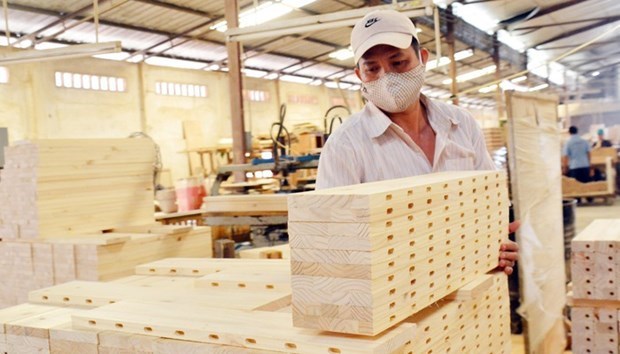
Vietnam’s wood exports this year are set to reach up to 11.5 billion USD. (Photo: VNA)
Do Xuan Lap, chairman of the VTFPA, said Vietnamese firms have been able to enter and gain footholds in numerous markets around the world, overcoming their shortcomings and limitations.
Exports of wood products to the US have seen a sharp rise this year, as well as robust growth to markets including Japan, the UK, Canada, Germany and the Netherlands, said the department of import-export under the Ministry of Industry and Trade.
With Japan and Canada partners in the Comprehensive and Progressive Agreement for Trans-Pacific Partnership (CPTPP), the department said Vietnamese firms are starting to take advantage of the trade deal’s reduced tariffs to penetrate these markets.
As the EU-Vietnam Free Trade Agreement (EVFTA) is set to take effect in 2020, Vietnamese firms can also look forward to similar tariff cuts and trade advantages from the EU, one of the country’s major export markets of wood products.
The department has set a target of 12 billion USD for wood exports in 2020, saying the fast growth of large markets such as the US and the EU are major drivers for the industry.
Nguyen Quoc Khanh, President of Ho Chi Minh City’s handicraft and wood processing business association, said the country’s wood sector, which has maintained a stable growth rate for the last two decades, is gearing up to become a leading player in Southeast Asia.
Khanh said with even more trade deals coming into effect, increased demand for Vietnamese products and large foreign investments flowing into the industry, Vietnam’s wood exports look likely to achieve the growth target of 20 percent next year.
Industry experts said the US would likely remain Vietnam’s largest export market in 2020. During the last ten months of 2019, Vietnam’s wood exports to the US hit nearly 4.2 billion USD, a 34.5 percent increase from the same period in 2018, and accounting for almost half of the country’s total wood export.
Such rapid growth, however, is not without risks, as Vietnamese firms can expect stricter regulations in the future as US agencies ramp up efforts to counter trade fraud, especially in relation to product origin.
While concrete steps have been taken by the Vietnamese government to prevent foreign goods from being falsely labeled as Made-in-Vietnam, trade authorities have warned Vietnamese firms against taking part in fraudulent activities to ensure healthy growth for the industry in the future.
Experts also advised firms to take action as soon as possible to build sustainable value chains, saying they would play a crucial part in the success of the industry. The industry’s value chain, which includes numerous tasks from planting forests, processing and commercialization of wood products to export, must be linked and integrated into firms’ long-term sustainable development strategies./.
VNA
 Central bank mulls raising gold position limit for lenders
Central bank mulls raising gold position limit for lenders



